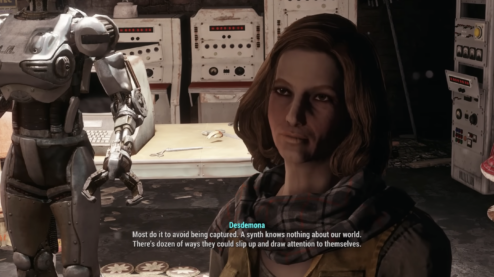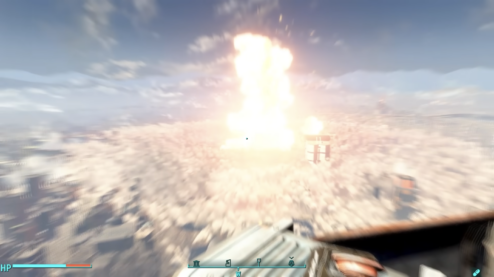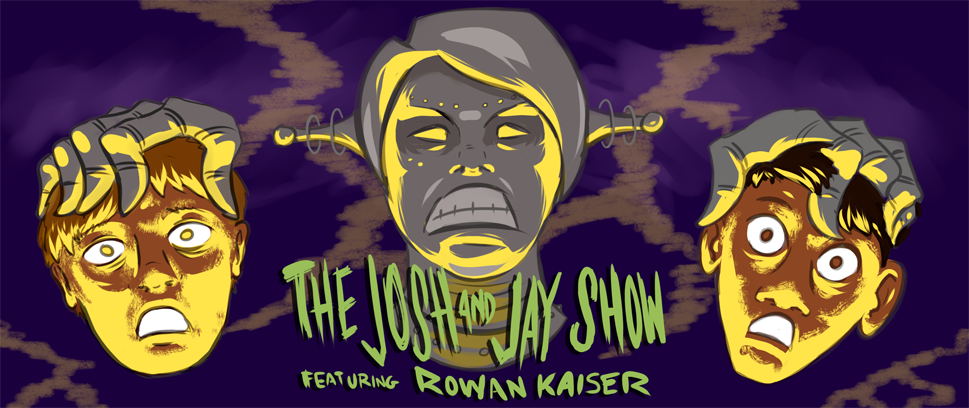
Fallout 4: The Railroad Has a Short Track
Like the rest of the Wasteland, the Commonwealth is struggling to pull itself back together into pockets of civilization. It has some unique challenges standing in its way, though: the lands are dotted with eyes always watching on behalf of a secret shadow organization that uses the world above as a testing ground for all sorts of contraptions. Any attempt to create governmental institutions that could enforce a common good end up destroyed by Manchurian candidates, imposters, saboteurs, and synthetic-human death squads.
The Institute – a walled garden of eggheads descended from survivors at this alternate version of MIT – are beyond using clanging metal deathbots. The state of the art ones have blood, skin, brains, and deep human emotions. The only thing that identifies them as artificial is a component within the skull that can only be collected after death, which means that this post-nuclear red scare can only truly be evaluated after the blood has been spilled.
Some of these synths are loyal to their creators, helping sow discord throughout the Commonwealth. Others are simply enslaved by a system that requires labor from them due to the circumstances of their birth, restrained by societal pressure and the constant threat of violence.
Fallout 4 does a lot of things – it tries to do a lot of things – but it doesn’t really try to be subtle.
With a central quest that seems focused at getting the player to encounter all four main factions instead of telling a gripping or coherent story, the parental search serving as its driving force loses steam pretty quickly. By the time I arrived at the Institute and started to interact with that entirely foreign world, I was far more driven by the plight of the synths.
This meant that when I was asked to pick a faction to side with during my first playthrough, I latched on to the Railroad.
The iconography and language is no mistake: those who break the enforced societal norm of synth hatred have taken on the moniker of the Underground Railroad: the complex and interconnected system by which enslaved people were hidden and given the means to continue their escape Northward by sympathetic benefactors – most of whom were white and at the least middle class.
Working through covert operations, dead drops, and secrecy, the Railroad should be the herald for the freedom of this oppressed, weaponized underclass.
Throughout my playthroughs of Fallout 4, I am always waiting to stumble into the “real” railroad: a competent organization of which the game’s group is a bumbling offshoot.

For an organization that is deeply technologically outmatched, who are fighting a politically-unpopular freedom campaign, the Railroad has absolutely no operation security. From a game design perspective, this is sort of understandable: Bethesda wants to ensure that all players encounter all of their factions before the main quest can be completed, and therefore all players must be able to discover them. The problem is, it’s done in such a gamey way that it renders the Railroad utterly toothless. I could see an encounter where the player’s Pip-Boy (a piece of Vault-Tec gadgetry that provides the in-game justification for the HUD and inventory systems) picks up an errant encrypted signal that the Railroad are using and is thus able to stumble onto a hideout/base.
The way that the player encounters them is by following a red line. When you’re done following the Red Line to their secret hideout, you have to enter a code.
The code is: RAILROAD.
In Diamond City, the main hud of commerce within the game, there is a newspaper still in print. Books in decent condition are scattered about. The notion that literacy is nonexistent in the Wasteland just doesn’t pass the smell test. And it especially doesn’t pass that smell test when the Institute – who have only ignored the Railroad based on their ineffectiveness as an organization – are a bunch of book nerds that absolutely know their letters and numbers.
In wrestling with my feelings on Fallout 4’s faction system, I’ve come to a hypothesis on why it exists in the form that it does: it connects to Fallout: New Vegas. Both games have four factions that posit different theories for how society could meaningfully rebuild itself.
In New Vegas, each faction is flawed. The New California Republic is a liberal state that attempts to re-engineer the American system that existed pre-nukes, but they are blighted with administrative bloat, military incompetence, and an inability to provide messaging for why people should want to exist in NCR territory. The Legion provides safe travel for merchants through the Wasteland, but they’re also fascists who hate women, enslave and crucify people, and generally work as the worst possible outcome for that guy you knew in high school who was redpilled and obsessed with Roman History. The city of New Vegas is brightly lit, economically successful, and safe, but it is segregated by wealth and its expansion suggests the spread of a libertarian “every man for himself” territory. The Wild Card is up to interpretation, but even in the kindest terms it makes a demagogue of the Courier.
Fallout 4 is aping the notion of isometrically-opposed, flawed factions. The Brotherhood of Steel, far from their humanistic portrayal in 3, have regressed to an ethnostate of colonists who fail to recognize the humanity of gen-3 synths, ghouls, or intelligent super-mutants. The Minutemen are well-meaning but so fragmented and politically undefined that they struggle to make headway without the player babysitting them.
Bethesda neuters the Railroad first by making them incompetent, but it continues by making them ideologically meaningless.
In one of the missions necessary to side with them at the end of the game, the player gets to witness a Railroad operative in the process of rescuing an escaped synth. The Sole Survivor fights off institute forces attempting to re-enslave them, and hands them off to the next escort.
We ask what is going to happen to this synth, and the answer is blunt: In order to protect the secrecy of the Railroad, the synth is going to be mind-wiped and overwritten with a new personality.
There’s not really a flowery way to say this, but it drives me absolutely bananas.
The organization that claims to recognize the sanctity of life in all of its forms has made it a practice to kill the life that it is rescuing. The body might get somewhere else, but the self that longed for freedom enough to risk death has walked right into it. Some memories might survive as nightmares, and the synth component will remain in their head to identify them as an artificial being, but they will otherwise be reduced to an infiltrator all the same, even unconsciously.

This is especially bitter when we learn of inter-faction conflicts within the broader Railroad. Some agents seem to believe that their protection/militarism should be extended to aid Gen-1 Synths, who are entirely metal robots who are given no characterization beyond being machines programmed to kill, parrotting digitized threats and sadistic taunts. One even suggests that a toaster is worth saving.
In a region that is self-cannibalizing due to this new Red Scare, every false personality implanted over a synth only justifies a bit more of that paranoia. The Institute thrives in secrecy and guerilla violence that successfully demonizes synthetic humans, and the Railroad chugs along with guerilla violence that treats the selves of this underclass as being disposable all the same. Trying to work with the Railroad is to work with a coalition of performative activists who lack the willingness to protect the humanity they claim to be preserving.
Fallout 4 is the brightest of the mainline series, and its music cues and narration hint at a world that is “Prepared For the Future,” but it has failed to incorporate any of the lessons from the past. Trying to side with the Railroad is philosophically draining – even as we nuked the Institute and ended their domination of the Commonwealth, I was incapable of feeling like I had brought any positive change to the Wasteland. I had just used another nuke to win a battle without any political windfall to make it last. There was no diplomacy, no communication, no broader societal shift that made these things possible.
The questions of Civil Rights and self-determination that the Railroad are attempting to posit to the broader Commonwealth are rendered secondary (at best) to secret-agent roleplaying. Even if I destroy the Institute and neutralize the Brotherhood of Steel, I’m never able to sense the direction of the revolution. Desdemona and her squad of well-meaning goons never seem to have an end justifying their means beyond one-upping the Institute. Even the path that aligns us with the synth’s oppressors allows us to make radio broadcasts to the outside world to assure them of our path, and perhaps even our noble cruelty, for a better future.
Instead, Bethesda seems to suggest that the Railroad’s backing philosophies are merely window-dressing – resistance built on compassion and shared humanity merely exists to virtue-signal. When their only means are violence, without any communication to the outside world or storytelling about the cruelties inflicted upon the marginalized underclass they aim to uplift, these justifications serve only themselves. They become the same meaningless drivel that the Institute and Brotherhood of Steel prattle off to justify their own brands of totalitarian control over the Commonwealth.
———
Joshua M. Henson has been playing video games since Doom II at the age of four, and hasn’t shut up about them since. You can find him on twitter posting very occasionally.



